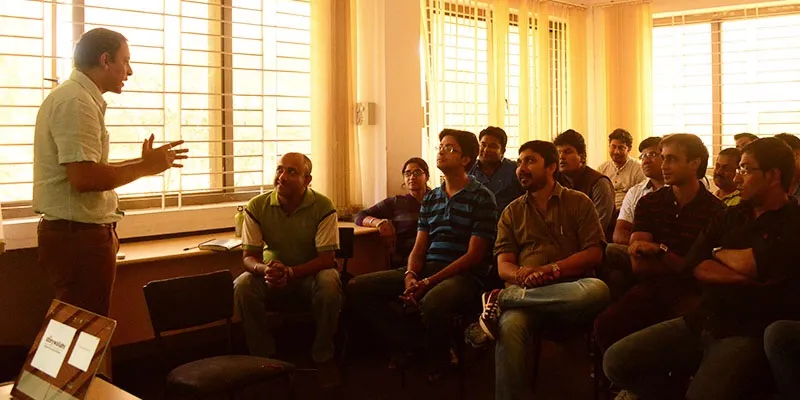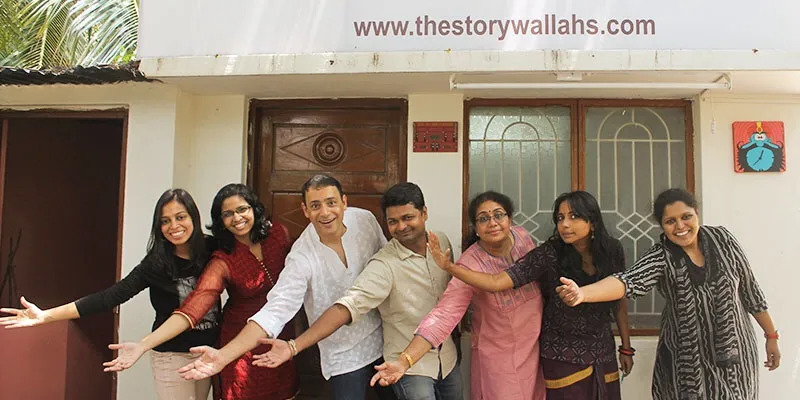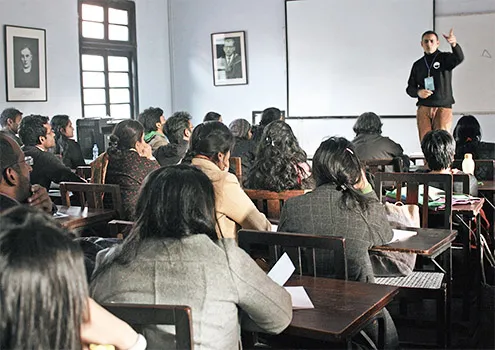‘I believe stories are wisdom disguised as entertainment’ – Ameen Haque of Storywallahs
Stories have an innate power to innovate, transform and change. Whether it’s around a fire or when snuggled inside a warm blanket, they have the capacity to weave magic. The Storywallahs believes that stories have shaped history and have the power to inspire change, motivate and teach people.
"We consume stories on a daily basis, they define our decisions, the ideology we follow, political leader we choose, career path and even our life partners,” says Ameen Haque, chief storywallah of Storywallahs. The organisation was created with the belief that stories are wisdom disguised as entertainment; and to leverage that wisdom in business and education is their main goal.
The insight

With his work in both theatre and advertising, Ameen realized that stories are influential. “I began to see a pattern of the person, brand and organization with the better story winning. I also began to see a correlation between leadership and storytelling,” adds Ameen. He felt that businesses could be flatter by leveraging the power of stories. “Why not make everyone a leader in their own ways,” asks Ameen. Another section where he felt storytelling was needed was the education sector. He says, “I also saw an opportunity in the education sector, we need to be taught through stories and not mugging.”
The beginning
Ameen has always been fascinated with how stories, mythology and symbols influence decision-making. Born and bought up in Gujarat, stories always played an important role in his life. “Being a voracious reader, I have always gravitated towards stories,” adds Ameen.
It was during his ninth grade that Ameen as he describes it, connected to a different world of stories – theatre . “It was a play I directed. Looking back now, I am actually embarrassed at my directorial skills. Luckily for me nobody told me anything so I kept practicing and getting better,” recalls Ameen. However, he soon got good guidance during his college days by the university theatre director.
Ameen soon completed a course in advertising from MICA and joined Ogilvy & Mather in Mumbai. “I was working as a trainee then, and I remember this one incident distinctly. One day I was in the toilet and next to me I happened to see a very familiar and handsome face. When I asked my colleagues, they informed that he was the creative director Sonal Dabral.”
Sonal Dabral is also famous for his role in the television serial ‘Fauji,’ “This got me thinking, that if the creative director, who is a busy guy can act, then even I could continue with my theatre. So I asked my boss if I could pursue theatre after work and he said okay,” adds Ameen.
Soon Ameen joined a theatre group in Mumbai called Ankur. The group would do both street and commercial theatre. “I was young and a bachelor, I was working in one of the best advertising agencies in the world, handling the best brands and was even able to do theatre -- it was the best place I could be in,” says Ameen.
After two years, Ameen joined McCann Erikson. “If you see the pattern, I was doing theatre and advertising, both are different kind of storytelling, followed by brand strategy, which again is another kind of storytelling,” says Ameen.
Ameen believes that whether it is social awareness, brand or political campaigns, advertising teaches you how to influence people to either do the right thing, or choose your brand. “It gave me a wonderful exposure to the human mind and influence. Theatre taught me the nuances of how to tell a story and use body language in storytelling, whereas advertising taught me the application,” adds Ameen.
During this period, Ameen also did a course in Film Appreciation by FTII and National Film Archives of India. “We had a workshop with Devdutt Patnaik and this helped me reconnect to mythology. So different aspects of storytelling started becoming a part of my life,” adds Ameen.
Soon Ameen moved to Bangalore and continued his work in advertising and theatre, and in 2012 he started Storywallahs.

Stories for education
“Do you remember the Pythagoras Theorem and can you explain it? Do you remember the Archimedes Principle? No? What about the hare and the tortoise, and the story of the monkey and the cap seller? How is it that you remember these stories, which were possibly decades old, and you cannot remember concepts that you were asked to relearn, rehearse and reproduce?” asks Ameen.
Storywallahs believe that there is a strong correlation between the teacher and the subject a child likes or dislikes. “If teachers can be storytellers then children will love and learn all subjects. Mathematics, science, social studies, and history, everything should be taught through stories,” adds Ameen. Identifying this gap, Storywallahs trains teachers on how to teach through stories.
Stories for businesses and entrepreneurs
Storywallahs believes that the power of storytelling needs to be amalgamated with data and science. “We understand stories, how to structure a story and what the spine of your PowerPoint should be. We even train people to take their back stories and align it with their business stories.”
It is understood that when an entrepreneur meets a venture capitalist, he works on data and projections. However, do they focus on the subtleties of non-verbal communication? “Entrepreneurs possibly spend close to an hour on an important slide, but how many actually focus on their body language strategy for that slide,” asks Ameen. Elaborating further he says, “People are looking at you not that slide. The PowerPoint just shows numbers and projections but you are the individual behind that story.”
Citing an example of Jack Ma, Founder of Alibaba, and the Soft Bank Founder Masayoshi Son, Ameen says: “We believe that it is data and facts that wins us investments, but it is the stories. Masayoshi on the investment of Softbank had said – ‘When I first met Jack, I had already met 20 other entrepreneurs. Everybody else was talking about business models and revenue projections, but Jack spoke about how he wanted to give every small Chinese businessman an opportunity to take his business online. He had no presentation, just a scrap of paper. After five minutes I told him take my money.”
Ameen says: “When individuals build institutions they enlist people in their dream and you can do that only if you can get them to see your dream as lucidly as you do. This can be done only through storytelling,” says Ameen.
He adds, “We believe that if businesses leverage the power of storytelling both internally and externally, then they can create history; and education can be fun and no longer a chore. Stories are ingrained in our very DNA. Storytelling has been a part of evolution, and a few years of modernity cannot change that.”

Web url: www.storywallahs.com







